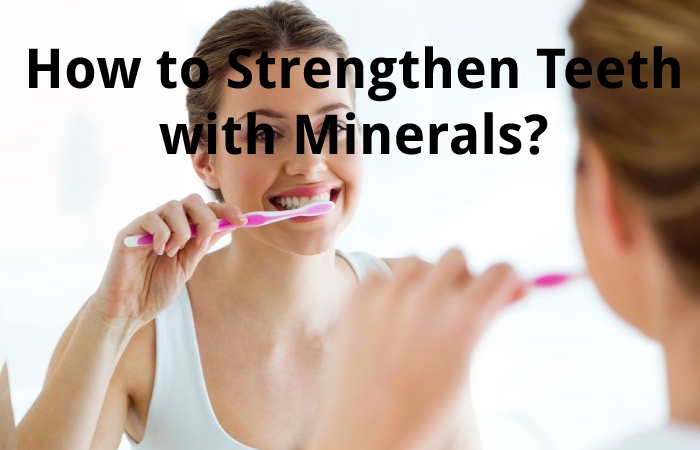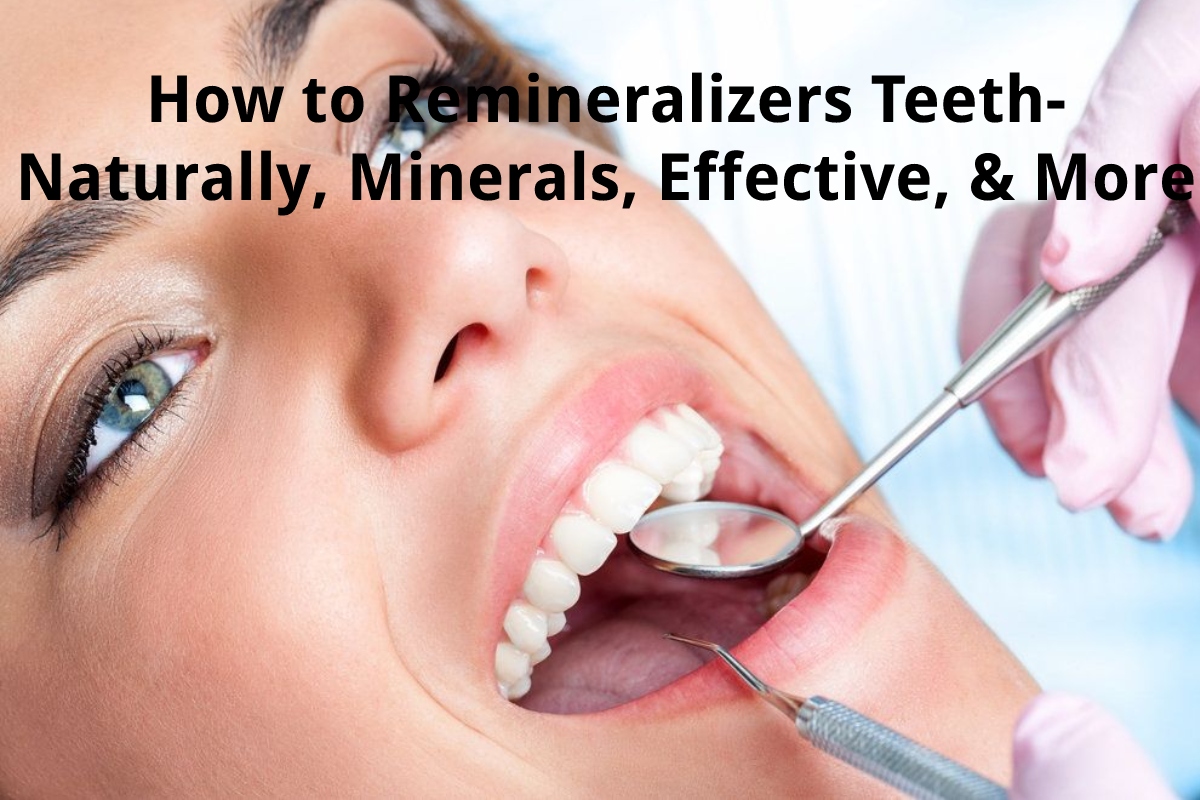Table of Contents
Remineralizers Teeth
Dental remineralizers teeth are part of minimally invasive dental treatments whose pillars ensure maximum patient comfort and tissue preservation and promote the body’s repairing capacity. It is a treatment that enriches the teeth with minerals, such as hydroxyapatite, calcium, phosphate, and nutrients to strengthen tooth enamel and thus prevent the appearance of cavities.
The digestion of the bacteria in our mouth produces acids that remove the minerals from our teeth; that is, they demineralize them, weakening the tooth enamel and making the teeth more vulnerable. However, at this stage in the growth of a cavity, its effect can be reversed by remineralizing the tooth with calcium and fluoride before the decay advances and forms a cavity that requires a filling.
How do Remineralizers Teeth Naturally?
Dental remineralization is a process that serves to enrich your teeth with additional minerals and nutrients to prevent tooth decay. Tooth decay or tartar is a fairly common problem that today is fixed with advanced approaches that aim to prevent, repair, and avoid dental damage.
To prevent the appearance of caries and damage to dental enamel, it is necessary to resort to dental treatments currently known as remineralization processes. These treatments add back the minerals removed from our oral cavity by acids, which also weaken your teeth and influence the formation of cavities.
How to Strengthen Teeth with Minerals?

As we have already mentioned, dental remineralization is a process that enriches the teeth with minerals that prevent dental caries. A dental filling can be avoided if the tooth is remineralized in time. Teeth are made up of minerals that form the tooth enamel representing the teeth’ outer layer. This plaque can be affected by bacteria produced by acids and simple sugars that remove minerals from the teeth. The result of this process is a hole in the tooth, that is, caries.
The remineralization process involves the ingestion of calcium and phosphates in your body, which will contribute to the prevention of your oral health. The best way to reach this is to use fluoride products to improve your tooth enamel. Alongside the traditional methods, which involve proper hygiene and regular visits to your dentist, there are also some home medicines you can use to remineralizers your teeth.
Home Remedies to get Minerals to Strengthen Teeth
Changing some of your eating habits is the best way to remineralizers your teeth. This refers to the entry of simple sugars that cause tooth decay. Therefore, you should eat foods rich in protein and contain carbohydrates, such as celery, peanuts, butter, broccoli, chickpeas, beans, pumpkin, beef and pork, liver, bananas, dairy products, natural soft drinks, etc.).
Likewise, it is advisable to use sugar-free gums at least 10 minutes after eating and consume fluoride water. On the other hand, you should also consider taking additional minerals in pill form. The most recommended minerals for your dental health are calcium, magnesium, zinc, iron, vitamin A, phosphorus, and vitamin D. These minerals are vital to prevent the growth of bacteria and plaque accumulation and protect tooth enamel from environmental influences. Outsiders that can harm you.
In addition to diet, you can also reconsider using products containing fluoride and other additional minerals that protect your oral cavity. This includes toothpaste, mouthwashes, and gels that can also contribute to oral health.
How are a Remineralizers Teeth?
The following measures, recommended by the dentist, help reduce the proliferation of bacteria, leading to dental caries’ appearance.
Brush your fangs with fluoride toothpaste for at most a little two to three minutes twice a day. If possible, brush after meals.
Increase your use of Fluoride as Remineralizers Teeth
Use a prescription antibacterial mouthwash (e.g., chlorhexidine) as recommended to reduce the number of harmful bacteria in your mouth.
Modifying you’re eating habits will also help you fight cavities. For example, remember not just the amount of sugar you eat but the frequency and types of foods you eat that increase your risk of developing tooth decay.
Healthy steps you can take to prevent cavities:
- Choose foods wisely following the food pyramid.
- Eat high-protein foods with high-carbohydrate foods (e.g., peanut butter and raisins on celery sticks).
- Eating sugary and sticky foods during a meal instead of alone as
- (During meals, saliva helps cleanse these foods from the mouth and protects teeth from cavities.)
- Drink fluoridated tap water when thirsty.
- Drink more milk or water and less carbonated soft drinks or fruit juices between meals.
- Reduce the frequency of snacking and snacking.
- Drink carbonated soft drinks or fruit juices with meals instead of sipping them throughout the day.
- Chew sugar-free gum (preferably one containing xylitol) for 10 minutes after eating.
Your dentist may recommend fluoride, a mineral that can “remineralize” and reinforce the surface of your teeth. Fluoride works to form new crystals in tooth enamel that are larger and more resistant to acid attacks. The following are some sources of fluoride:
- Fluoridated water.
- Fluoride toothpaste.
- Over-the-counter fluoride rinse.
- Prescription fluoride gel or toothpaste.
- Fluoride treatments, such as fluoride varnish.
How Effective is Remineralization?
This treatment is highly effective in discontinuing or reversing early tooth decay as long as you follow the dentist’s recommendations. However, if you don’t follow them, the decay can progress, and the tooth must be filled. Therefore, it is essential to have regular evaluations of the area affected by pollution.
These appointments are called “cavity control scans.” Your dentist will tell you how often these scans are needed. If you have more questions about the remineralization process, ask your dentist in Vigo.
How are Remineralizers Teeth in the Dental Clinic?
Dental clinics use fluoride gels in high concentrations to carry out dental remineralization treatment. In this way, we prevent the small lesions that may have caused the decay from continuing to advance and deepen in the tooth to the point of causing pain and requiring a filling or even a root canal in the advanced stages.
As we mentioned before, dental remineralization helps us prevent the appearance of cavities, so this treatment can be carried out if the dentist observes a weakened enamel prone to pathologies. However, it is also significant to remember that this remineralization treatment can only reverse microscopic caries, that is, those found in very early stages.
How to Strengthen Tooth Enamel at Home?

The best way to ensure good oral health and a strong and healthy enamel that helps us prevent cavities and other pathologies is to take care of ourselves daily. At Centro Premodern, we have prepared this list with the best tips to take care of your teeth:
Perfect your Daily Dental Hygiene
Through thorough brushing with fluoride toothpaste, dental floss, interdental brushes and appropriate mouthwashes, we will ensure that we eliminate practically 100% of food remains, avoiding the accumulation of bacteria and, therefore, the formation of bacterial plaque on the teeth.
Take Care of your Diet
Eating habits reflect and impact our teeth and gums, so it is essential to a balanced diet rich in fruits and potatoes. In addition, try to reduce your intake of sugary drinks and acidic foods that can erode tooth enamel. In addition to calcium, dairy products contain casein, a protein that helps against demineralization.
Pay Attention to Foods with Neutral pH
Cheese, vegetables, and nuts have a neutral pH, which is key to maintaining an environment in which dental remineralization can occur.
Stay Well Hydrated
Saliva is our great ally in caring for our oral health, so we have to maintain proper hydration so that its production is adequate.
Chewing Sugar-Free Gum
Chewing these guys can help increase saliva production, remove food debris, and help balance the natural pH of the mouth.
Increase Your Intake of Fluoride
One of the best ways to ensure a good fluoride intake is to drink fluoridated water from public drinking water supplies. However, check with your dentist to avoid consuming too much fluoride, as this could lead to fluorosis, an abnormality in tooth enamel.
Conclusion
If you’ve ever wondered if you can reverse a cavity or how to remineralizer teeth, you’re one of many. Unfortunately, studies show that tooth decay is one of the most common diseases. 90% of adults aged 20-64 have had dental caries in their lifetime. And approximately 1 in 4 have actively untreated decay.
Also Read: Healthy Breakfast on the Go – Important, Dairy, Rules, & Examples

